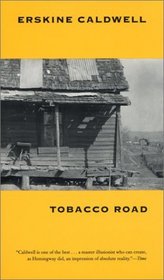Helpful Score: 1
I loved this book. Nothing like I have read before. It is a quick read, but makes you sit back and think.
Helpful Score: 1
Set during the depression, it is the story of the Lesters, a family of white sharecroppers so destitute that most of their creditors have given up on them. Debased by poverty to an elemental state of ignorance and selfishness, the Lesters are preoccupied by their hunger, sexual longings, and fear.
Caldwell's tale of destitute sharecroppers in 1920s Georgia juxtaposes the ignorance of the characters with black humor. Pretty grim, but fortunately it's a quick read.
This is one of the best books I have ever read. Being a farm girl in rural Oklahoma, I can so relate. Very good & quick read. Five stars
Classic rural American literature by prolific Southern writer of the 1930s and 40s
Classic rural American literature by prolific Southern writer of the 1930s and 40s
Supossedly a classic, but I thought it was a weak imitation of William Faulkner. Maybe you'll like it.
The most tasteless, degrading depiction of the South I have seen in a long time. No wonder people think we are goofy and inbred after reading books like this one.
Wow. This short but powerful story reads like a cross between a Steinbeck novel of social commentary and a Coen brothers black comedy/tragedy film. In it, we get a raw and disturbing view into a family and small farming culture that has been all but destroyed by those holding the money and the power; the banking industry, evangelical religion, corporate farming, and the industrial revolution, have literally left these desperately poor people in the dust. All that is left is a destitution so deep and irreversible that it has reduced the family and surrounding community to a barely human condition, dealing with hunger, lust, superstition, and fear. Yet to their last breath, they are able to hang on to their dream of farming and their love of the land. This story is even more disturbing and sad in that we can still see this pattern of money, religion, and power controlling and crushing the poor in spirit playing out in today's society and culture. One would have hoped that this country could have made more progress toward justice and equality in the last 100 years. So it goes.
This book makes me understand the eugenics movement better.




